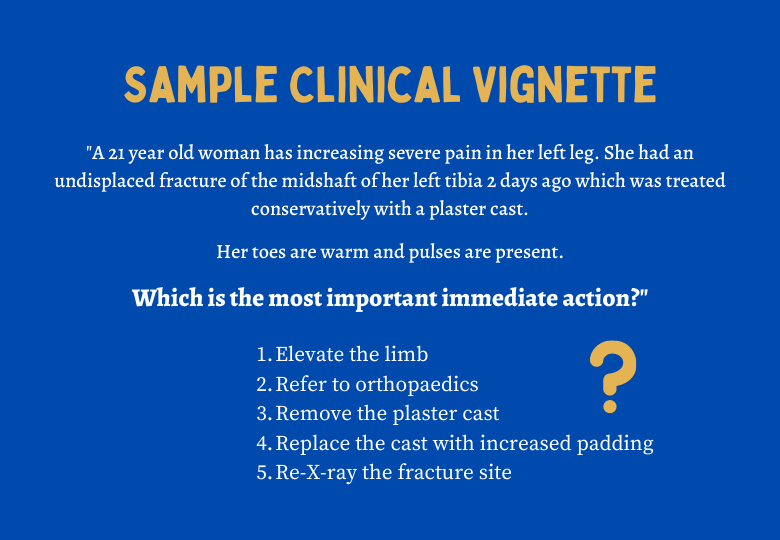
Published June 13, 2023 | Updated June 4, 2024
By Myra Safdar
An IMG who bought the NHS dream thanks to a childhood obsession with Harry Potter. Myra currently juggles various roles as a junior doctor, freelance writer, and medical curator at an American medical education startup.
Are you a foreign medical graduate thinking about a career in the UK – the tiny island nation that gave the world English, Shakespeare, and Harry Potter?
If you graduated from a medical school within the EEA, you don’t need to worry. But if your medical school is located outside the European jurisdiction, you need to clear the PLAB hurdle first!
But don’t fret! As a medical student, you probably grew used to taking endless assessments and exams. The PLAB is just another exam that you need to pass if you’re determined to work in the British healthcare system. There are other options, such as completing a fellowship exam like MRCP or finding a placement on the MTI scheme, but PLAB is the most common route.
In this guide, we will discuss almost everything you need to know about the PLAB-1 exam – the first part of the PLAB series.
What is PLAB?
PLAB (Professional and Linguistic Assessment Boards) is a two-part licensing exam administered by the General Medical Council (GMC) – United Kingdom’s regulatory body for doctors.
Like its other international medical licensing exam counterparts, the PLAB exams test candidates on clinical knowledge and skills needed for safe medical practice.
However, unlike other foreign licensing exams such as the USMLE (United States Medical Licensing Exam), the PLAB doesn’t test your ability to memorise random basic medical science minutia. Instead, you will be tested on your ability to apply medical knowledge and manage clinical situations typically encountered at the level of a Foundation Year Two (FY2) doctor.
Being familiar with UK best practices and clinical guidelines is a crucial component of the PLAB exams. While it is often said that medical knowledge is universal, the same can’t be said about medical practices. There are subtle cultural differences in everyday clinical interactions and medical ethics that might be different from your home country. Moreover, patient communication styles might be different, and not being aware of them can adversely impact patient care. Therefore, it is important you develop a good understanding of UK clinical practice, ethics, and guidelines before you sit the exam.
Passing both parts of the PLAB exam allows International Medical Graduates (IMGs) to join the UK medical register. However, keep in mind that passing the PLAB exam does not automatically qualify international doctors to join the Specialist or GP Register.
If you’re an overseas consultant and want to join the Specialist register, you should look at the GMC website for further guidance.
About the PLAB 1 Exam
PLAB 1 is the first exam in the series. It is a written, MCQ-based exam which tests candidates on their ability to approach and manage clinical situations commonly encountered as an FY2 or house officer in UK hospitals. While it is often considered less daunting than the OSCE-based part 2, it shouldn’t be taken lightly. You will need to demonstrate sufficient clinical knowledge to satisfy GMC’s requirements of a ‘safe’ doctor.
The exam consists of 180 single-best-answer multiple-choice questions that must be answered within an allocated time of three hours. There is no negative mark for any incorrect answer.

The Exam Question Format
Questions consist of clinical scenarios covering a wide range of acute and chronic illnesses that are typically encountered during work as a Foundation Year 2 (FY2) doctor in the UK.
The basic anatomy of a PLAB-1 question is usually as follows:
Clinical Vignette
This is a hypothetical patient encounter that lists all the relevant details that would be needed to answer the question. The details provided generally include
- The patient’s demographics
- Presenting complaint
- Past medical history
- Relevant physical exam findings or lab results.
The setting could either be an emergency department, GP surgery, or a medical ward.
Question
Based on the information provided in the clinical vignette, candidates are then asked to select a probable diagnosis, appropriate investigation or management for the patient.
Following is a sample PLAB-1 question taken from the GMC website:
Since the exam is designed at the level of doctors who have not undergone any speciality training, you will not be asked about any specialist-level investigations or management plans. Therefore, it is important to be aware of the role expectations and limitations of a Foundation Year 2 doctor (FY2).
PLAB 1 Curriculum
The exam curriculum is outlined in the PLAB blueprint. The blueprint closely follows the Foundation Programme Curriculum and covers topics related to general medicine, surgery, gynaecology and obstetrics, psychiatry, general practice, and medical ethics.
Medicine is the subject most likely to come up in the exam (including all subspecialties to medicine such as cardiology and respiratory), but the GMC keeps the exact breakdown a secret, so we can’t tell you exactly what will come up.
Specialist-level content is generally excluded from the exam. Even if you’re a consultant in your home country, you won’t be asked anything that is outside the scope of an FY2 doctor. So it’s better to focus on revising the basics.
PLAB MCQ Exam Techniques
Like other multiple-choice-based medical exams, you can increase your odds of passing PLAB-1 by using the following test-taking strategies:
Read the Question First
Many inexperienced candidates waste a lot of time reading clinical vignettes from start to bottom. This is not a good idea, especially when every second in the exam counts!
Instead, a technique that can help you save valuable time is to always read the question first. This will help you determine what information you need to look for in the vignette.
For example, you might have a long clinical vignette with several distractors thrown in by the exam writers that might have no relevance to the actual question. At the end, the question might be something along the lines of, “What is the mechanism of action of aspirin?”
If you had read the question first, you would have quickly guessed the answer without wasting time on reading the entire vignette!
Look Out for Trigger Words
Small words like initial, definitive, and appropriate can change the meaning of a question.
Similarly, the phrase ‘best next step in management’ would totally alter your answer choice.
For example, in a question about STEMI, the initial treatment would not be the same as the definitive treatment. The initial treatment offered to the patient would be aspirin or GTN spray.
However, the definitive treatment in a patient with STEMI would be PCI. Being able to identify subtle differences in language can massively improve your chances of passing the exam.
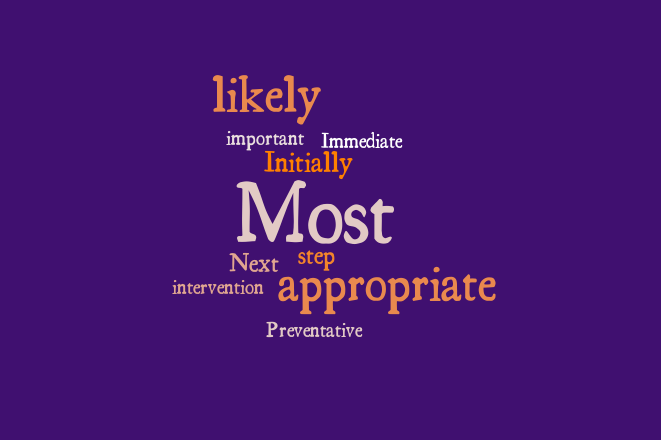
Use the Elimination Technique
Despite endless hours of revision, you might come across a question on the exam that you may have absolutely no clue about. While it might be tempting to mark an answer at random, you should try using the elimination technique to give yourself the best shot of guessing the correct answer. Eliminate the obviously incorrect answer choices, and try to make an educated guess between the remaining options.
Time Management is the Key
Many PLAB-1 candidates report they struggle to manage their time efficiently during the exam. You can improve your time management skills by allocating a specific time for each question. Try to answer each question within the specified timeframe. If you find yourself stuck on a difficult question, don’t waste too much time on it. Instead, skip it and try to answer it once you’re done with all the easy questions. Keep an eye on the clock, and pace yourself accordingly.
Don’t Leave Answers Blank Until the End
If you have guessed the correct answer, you should mark it down on the answer sheet without leaving it for the end. Since you will use a pencil to mark your answers, you can always change your answer later on when you have time to review. You definitely don’t want to end up in a situation where you’re left with a blank answer sheet and only five-minutes remaining to finish the exam!
Stay Calm
The most important tip: stay calm! No matter how much you feel like you’re running out of time or that you will flunk, don’t panic. Take a deep breath and relax. As a doctor, you’ve been through several exams throughout your career. Reframe your mind into thinking of PLAB-1 as just another exam. You will have a much higher chance of passing the exam if you don’t let your nerves get the better of you. A clear and relaxed mind will help you better focus on the task at hand. If you feel like you’ll be a nervous wreck on the day of exam, try practising relaxation techniques.
How To Apply for the PLAB 1 Exam
If you’ve made up your mind about pursuing a medical career in the UK, you should take the following steps to book a PLAB-1 seat:
Step One – Check Your Eligibility
The PLAB-1 exam can only be taken by medical graduates. If you’re still currently enrolled in medical school, you will NOT be eligible to sit the exam. You need to have an acceptable primary medical qualification (PMQ) to be able to book the PLAB-1 exam. This is the medical degree awarded by your medical school. The GMC have listed all their requirements of an acceptable overseas medical degree. If you graduated from a school that is not listed in the World Directory of Medical Schools, you might not be eligible to book a PLAB-1 date except in very limited circumstances.
Step Two – Make an Account with GMC Online
To book PLAB-1, you need to first register with GMC Online. You will be asked about your demographic information, medical school details, and date of graduation. Once you’ve set-up a GMC account, you can log in and access available PLAB-1 dates after you’ve successfully submitted your English language evidence.
Step Three – Provide Evidence of Your English Language Skills
Proficiency in English language is necessary for any medical practitioner hoping for a career in the United Kingdom. You can demonstrate your English language skills by either submitting an IELTS or OET certificate, or by providing evidence from an employer based in an English-speaking country. If you obtained your medical degree from a country where English is the native language, you don’t need to take any English language tests. You can use your medical degree as a proof of your English language evidence.
If you’ve decided to sit for the IELTS (International English Language Testing System) or the OET (Occupational English Test), you need to meet the basic minimum requirement as set by the GMC.
For IELTS, you need to score 7.0 in each domain (speaking, reading, listening, writing) with an overall score of 7.5. For OET, you need to get a grade B in each tested domain. Your IELTS or OET certificate will be valid only for two years. The GMC will verify your English language evidence within two working days.

Step Four – Book Your Exam
Once your English language evidence has been approved by the GMC, you will be eligible to book an available PLAB-1 slot.
Exam Fees
As of April 2023, the cost for PLAB-1 is £255. For refugee doctors living in the UK, the exam is free of charge for the first two attempts.
You can pay for the exam using a debit or a credit card (Visa or Mastercard) that allows for international payment.
GMC Online Refund Policy
If you need to cancel your PLAB 1 exam, you will incur a fee. For those who cancel over 42 days from the exam date, the fee as of April 2023 is £25.50. For those who cancel after this time, you will unfortunately not receive a refund.
| PLAB Cancellation Fee | Bookings from 1 April 2023 |
|---|---|
| >42 days before exam | £25.50 |
| <42 days before exam | £255 |
PLAB 1 Exam Dates 2024
The PLAB-1 exam is held four times a year in the UK and in international centres. Relevant British Council authorities conduct exams outside the UK on behalf of the GMC.
Following are the upcoming PLAB-1 exam dates in 2024:
| Exam Date | Overseas closing date | UK closing date |
|---|---|---|
| 23rd May 2024 | 11th Apr 2024 | 9th May 2024 |
| 8th Aug 2024 | 27th June 2024 | 25th July 2024 |
| 7th Nov 2024 | 26th Sept 2024 | 24th Oct 2024 |
| 20th Feb 2025 |
UK Venues
The PLAB 1 exam takes place in several venues in the UK as well as many international venues. There are currently (as of June 2023) 9 UK venues including:
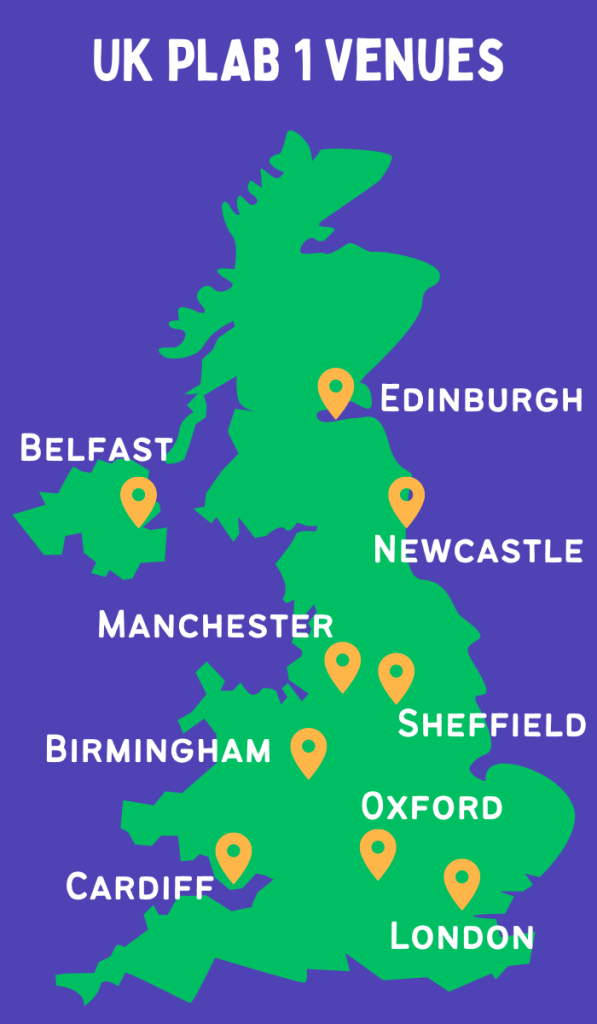
International Venues
You can also choose to sit the PLAB 1 exam at international locations, with venues in 24 locations in 15 countries internationally as of June 2023. You will find the contact details for tHere are the current locations.
You will find the contact details for these exam centres here.

Exam Results
The GMC usually announces PLAB-1 results 6 weeks after the exam date. You will be able to access your results in your GMC Online account under ‘My Tests’ section. Due to data privacy reasons, you won’t be able to access your results via phone, fax or in person.
The tentative dates for PLAB-1 results for 2023 have already been published on the GMC website. The following are the expected result dates for the tests held in 2023:
| Exam Date | Result Date |
| 23rd May 2024 | 4th July 2024 |
| 8th August 2024 | 19th September 2024 |
| 7th November 2024 | 19th December 2024 |
| 20th February 2025 | 3rd April 2025 |
In the results, you will be told about your score, the score needed to pass the exam, and the average score obtained by all candidates. You will also be given a summary of your individual performance in the following three domains:
- Applying knowledge and experience to clinical practice
- Good clinical care: assessment
- Good clinical care: management
After passing the PLAB-1 exam, you will be eligible to book any available PLAB-2 test date.
It’s important you keep checking the GMC website for any further updates on PLAB-1 or any changes in the tentative result dates.
PLAB 1 Passing Score
The GMC states they calculate the pass mark for the PLAB-1 exam using the ‘Angoff method’. The Angoff method is a scoring technique that involves a panel of subject experts to determine the difficulty level of each question item in the test. The cut-off score is then determined on the probability basis of a minimally competent person being able to answer each item correctly.
According to GMC, the pass mark is set to reflect the expectations they have from doctors entering the second year of the Foundation Training Programme.
Most overseas doctors taking the PLAB exam are at varying levels of their careers, and there is no expected ‘perfect’ score. What matters to GMC is the ability of candidates to demonstrate essential knowledge and skills needed for safe medical practice in the UK.
The specific mark required to pass might vary with each exam, but according to most unofficial sources, you need to score at least in the range of 60-65%.
Passing Rate
The passing rate for PLAB 1 varies from year to year and will likely change further when the PLAB is changed to make it compliant with UK MLA requirements in 2024. The average passing rate over the past 5 years is 69.4% but has been as high as 74.1% and as low as 63.1%.
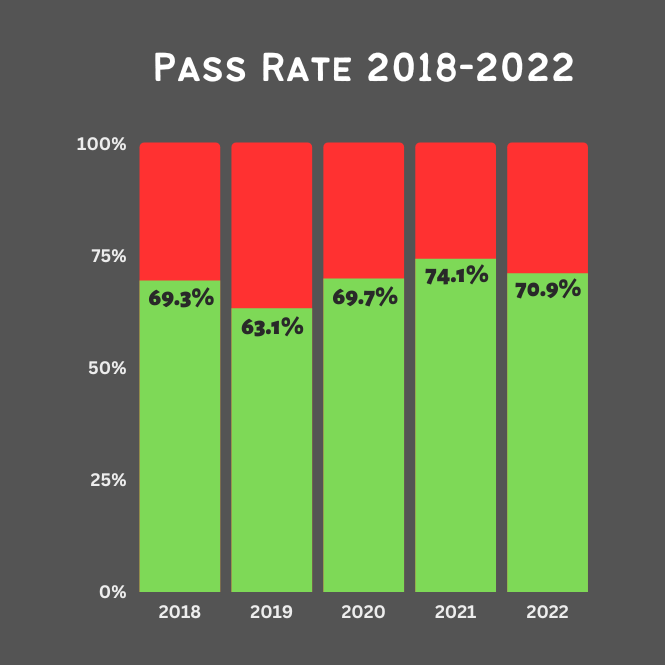
There are a number of factors that may contribute to the variability of the passing rate for PLAB 1. One factor is the increasing availability of resources to help IMGs prepare for the exam – there are more events, books, and question banks available in a more accessible format such as with on-demand courses.
Another factor in the pass rate is the number of candidates who are taking the exam, and the external factors such as when exam centres were closed due to the COVID-19 pandemic.
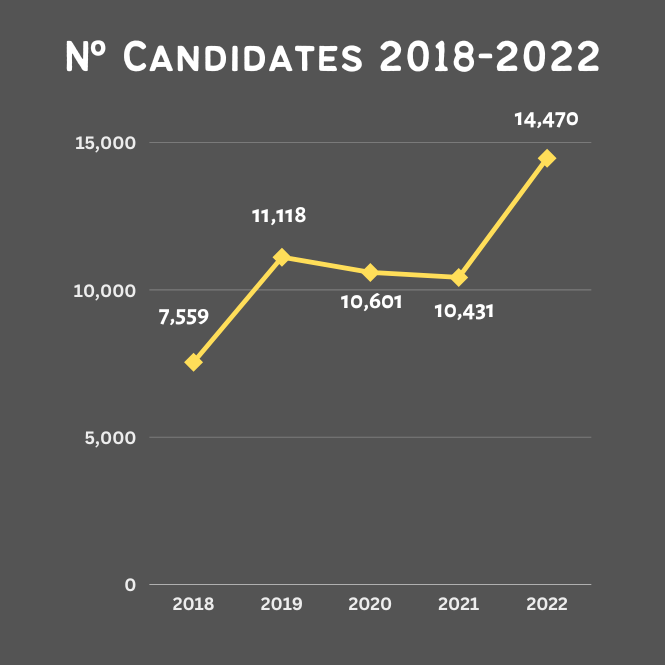
Is PLAB Being Replaced by the UK MLA?
The UK Medical Licensing Assessment (UK MLA) is a new exam which will be used to assess whether a candidate is suitable for entering the GMC register. This will affect 2 cohorts:
- UK Medical Students who will need to take the exam prior to joining the medical register from the 2024/2025 academic year
- International Medical Graduates who will see a change in the PLAB exam in 2024 to make it compliant with UK MLA standards
So, does that mean that the PLAB is being replaced by UK MLA?
According to the GMC, the answer is no. International Medical Graduates who wish to apply for GMC registration to work in the UK will still need to take the PLAB 1 exam in 2024 despite these changes. While the PLAB exam is being changed to make it compliant with the UK MLA, the exam is not being replaced.
The exam itself is unlikely to change much, but instead, the quality assurance process will ensure that the exam maps to the MLA content map. The PLAB blueprint will be replaced with the content map, so there may be a little change to the curriculum, but the material nature of the exam won’t change significantly.
You also don’t need to change your PLAB revision – everything you’re learning for PLAB will still be relevant to the exam in 2024.




